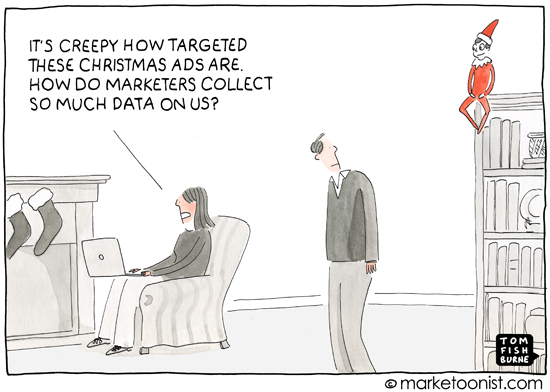Jesse Beard
jb071416@ohio.edu
 |
| Tom Fishburne, Copywrite 2014 marketoonist. Retrieved from: https://marketoonist.com/2014/12/targeted.html |
With the exponentially increasing amount of data on the average person, advertisers have become especially good at targeting ads towards the people who are most susceptible to their pitch. It has now become the norm to track people's spending habits and record who is most likely to shop where and when they are likely to spend. I am sure that most of us are familiar with the feeling of saying something out loud that soon forms into an ad or even a series of ads displayed on our devices. But is this the extent of how far advertisers will go or is it just the limit of their technological capabilities?
The world of advertising is inherently very competitive, simply because everyone wants your business but only some will actually acquire it. Given this reality, it is not exactly a surprise when they use the tools they are now allowed to do some ethically questionable advertising. While it is usually illegal and often ethically questionable to discriminate based on race, gender, religion, disabilities, or familial status; it is deemed perfectly acceptable to do so in the advertising world and even encouraged in the process of market segmentation.
Drawing these barriers when it comes to ads may not sound too bad at first until you consider the scope of what is considered advertising. Certain messages being sent to certain demographics based on the data they collect is essentially the process that led Mark Zuckerberg into the hot seat against congress. This process is creating a bubble of information and often misinformation based on the differences between the demographics of people. Political advertisements being the most problematic example of this practice as people are being influenced continual reinforcement of certain ideas as they were already leaning towards, becoming more radical, or at least confident in their beliefs. The issue is that if people are simply passively absorbing this media instead of finding their news they are only hearing one side of the story, there is no watchdog to tell them when their ideals have not been represented.
This is not only dangerous when coupled with 'fake news' but is a problem enough by itself. If you are not making a concerted effort, you may be reading legitimate news coverage but, even if you are, they are only the ones that will bolster your opinion. Our social media is by default, a political bubble, as people tend to follow those that share similar opinions and ignore/unfollow those that post things they do not agree with. This effect has been noticeably polarizing politically socially, with people completely ignoring the other side and focusing only on what their viewpoint already aligned with, even if you are "friends" with someone of the other party their posts may be hidden as you do not click on similar political posts as often. Google will even tailor your searches to greater please your sensibilities.
Internet Activist, Eli Pariser had a lot to say about this echo chamber effect in his TED Talk, describing it as a "personal, unique universe of information that you live online. And what's in your filter bubble depends on who you are, and it depends on what you do. But the thing is you don't decide what gets in. And more importantly, you don't actually see what gets edited out."
I feel that this is an inevitable effect of the AI-led nature of advertising and media as a whole. The only way to circumvent this process is to return to human-filtered media. That in which the biases may at least be recognized rather than encouraged. Additionally, it will hopefully soon result in legislation that is designed to mitigate this impact.
No comments:
Post a Comment